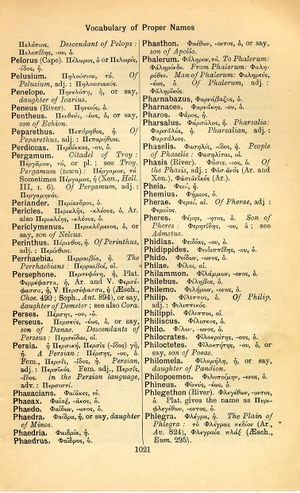Perseus
ἀλλὰ διὰ τῆς ἀγάπης δουλεύετε ἀλλήλοις. ὁ γὰρ πᾶς νόμος ἐν ἑνὶ λόγῳ πεπλήρωται, ἐν τῷ Ἀγαπήσεις τὸν πλησίον σου ὡς σεαυτόν → but be enslaved to each other through love; for the whole Torah is fulfilled in one statement: You will love your neighbor as yourself (Galatians 5:13f.)
English > Greek (Woodhouse)
Περσεύς, -έως, ὁ, or say, son of Danae.
Descendants of Perseus: Περσεῖδαι, οἱ.
Latin > English (Lewis & Short)
Persēus: a, um,
I
v. the preced. art., I. B. 1.
Perseus: ĕi and ĕos (acc., Persea, Ov. M. 4, 610), m., = Περσεύς.
I Son of Jupiter and Danăē, abandoned by his grandfather Acrisius, but rescued and brought up by Polydectes, king of Seriphus. When grown up, he undertook, at the instigation of Polydectes, an expedition against the islands of the Gorgons, and received from Vulcan a sickle-shaped sword, from Mercury winged shoes, and from Minerva a shield and the flying horse Pegasus. Thus armed, he killed and cut off the head of Medusa, whose look turned every thing into stone. On his way back, he, by means of it, turned into stone a sea-monster to which Andromeda, the daughter of Cepheus, was exposed, and married her. Their son Perses became the progenitor of the Persians. After his death, Perseus was placed among the constellations, Ov. M. 4, 609 sq.; Hyg. Fab. 64; 244; id. Astron. 12; Cic. N. D. 2, 44, 112; Prop. 2, 30 (3, 28), 4; 2, 28 (3, 24), 22; Serv. Verg. A. 4, 246.—
B Hence,
1 Per-sēus, a, um, adj., of or belonging to Perseus, Persean, Prop. 3 (4), 22, 8: Perseos alter in Argos scinditur, i. e. where Perseus's grandfather, Acrisius, reigned, Stat. Th. 1, 255: Persei culmina montis, the mountain where Perseus first mounted Pegasus, id. ib. 3, 633: Persea Tarsos, founded by Perseus, Luc. 3, 225: Babylon, id. 6, 449.—
2 Per-sēïus, a, um, Persean: Perseia castra sequi, to fight in his army, Ov. M. 5, 128.—
II The last king of Macedonia, v. Perses, IV.

